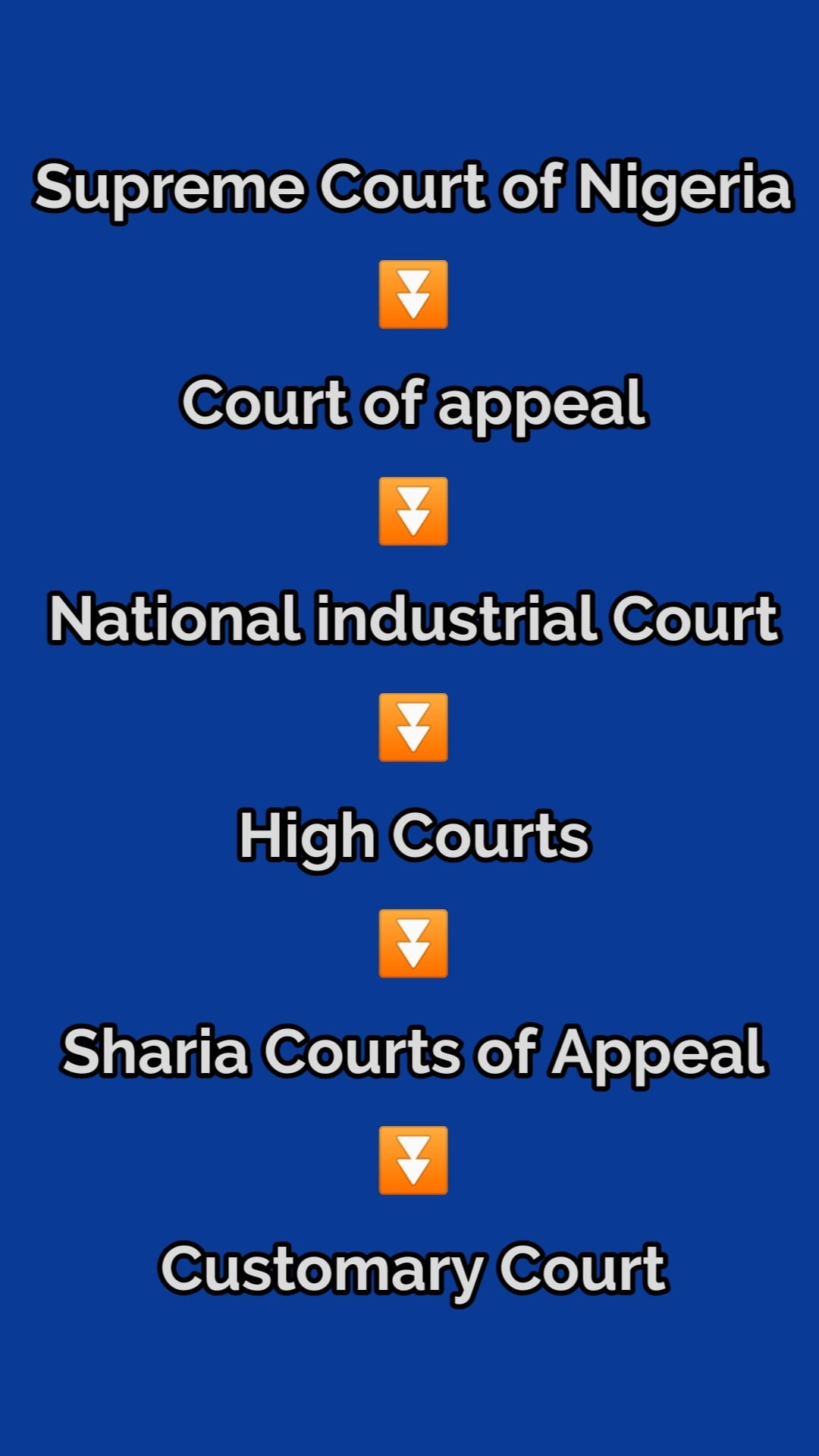Unveiling The Legal Landscape: Discover Nigeria's Judicial System
The Nigerian court system is a complex and hierarchical structure, with various levels of courts handling different types of cases. At the bottom of the hierarchy are the Magistrate Courts, which have jurisdiction over minor offenses. Above the Magistrate Courts are the High Courts, which have jurisdiction over more serious offenses and civil matters. The Court of Appeal is the next level up, and it has jurisdiction over appeals from the High Courts. At the apex of the Nigerian court system is the Supreme Court, which has jurisdiction over appeals from the Court of Appeal and other lower courts.
The Nigerian court system is important for a number of reasons. First, it provides a forum for the resolution of disputes. Second, it helps to protect the rights of individuals and businesses. Third, it contributes to the development of the rule of law in Nigeria. Historically, the Nigerian court system has been influenced by a number of factors, including British common law, Islamic law, and customary law.
The main article topics that will be discussed in this article include the following:
- The structure of the Nigerian court system
- The jurisdiction of the different levels of courts
- The history of the Nigerian court system
- The role of the Nigerian court system in the development of the rule of law
list of courts in nigeria
The Nigerian court system is a complex and hierarchical structure, with various levels of courts handling different types of cases. The main types of courts in Nigeria are:
- Magistrate Courts
- High Courts
- Court of Appeal
- Supreme Court
The Nigerian court system is important for a number of reasons. First, it provides a forum for the resolution of disputes. Second, it helps to protect the rights of individuals and businesses. Third, it contributes to the development of the rule of law in Nigeria. Historically, the Nigerian court system has been influenced by a number of factors, including British common law, Islamic law, and customary law.
Magistrate Courts
Magistrate Courts are the lowest level of courts in the Nigerian court system. They have jurisdiction over minor offenses, such as traffic violations, petty theft, and assault. Magistrate Courts are also responsible for conducting preliminary hearings in more serious cases, such as murder and rape. These courts play a vital role in the Nigerian justice system by providing a forum for the resolution of minor disputes and by helping to ensure that more serious cases are properly investigated and prosecuted.
One of the most important aspects of Magistrate Courts is their accessibility. They are located in every local government area in Nigeria, making it easy for people to access the justice system. Magistrate Courts also have relatively simple procedures, which makes it easier for people to navigate the legal system without the need for a lawyer.
Magistrate Courts are an essential part of the Nigerian court system. They provide a vital service to the community by resolving minor disputes and helping to ensure that more serious crimes are properly investigated and prosecuted.
High Courts
High Courts are the second level of courts in the Nigerian court system, after Magistrate Courts. They have jurisdiction over more serious offenses, such as murder, rape, and robbery. High Courts also have jurisdiction over civil matters, such as contract disputes, property disputes, and family law matters.
High Courts play a vital role in the Nigerian justice system. They are responsible for trying some of the most serious crimes in the country, and they also handle a wide range of civil matters. High Courts are also responsible for hearing appeals from Magistrate Courts.
One of the most important aspects of High Courts is their independence. They are not subject to the control of the executive or legislative branches of government. This independence is essential for ensuring that High Courts can make fair and impartial decisions.
High Courts are an essential part of the Nigerian court system. They play a vital role in protecting the rights of individuals and businesses, and they contribute to the development of the rule of law in Nigeria.
Court of Appeal
The Court of Appeal is an intermediate appellate court in the Nigerian court system. It has jurisdiction to hear appeals from the High Courts and other lower courts. The Court of Appeal is also responsible for interpreting the law and developing the common law. Historically, the Court of Appeal has played a vital role in the development of the Nigerian legal system. It has helped to ensure that the law is applied fairly and consistently throughout the country.
The Court of Appeal is an important part of the list of courts in Nigeria. It is a vital component of the justice system and plays a key role in protecting the rights of individuals and businesses. The Court of Appeal also contributes to the development of the rule of law in Nigeria.
One of the most important aspects of the Court of Appeal is its independence. The court is not subject to the control of the executive or legislative branches of government. This independence is essential for ensuring that the Court of Appeal can make fair and impartial decisions.
Supreme Court
The Supreme Court is the highest court in the Nigerian court system. It has jurisdiction to hear appeals from the Court of Appeal and other lower courts. The Supreme Court is also responsible for interpreting the law and developing the common law. Historically, the Supreme Court has played a vital role in the development of the Nigerian legal system. It has helped to ensure that the law is applied fairly and consistently throughout the country.
The Supreme Court is an important part of the list of courts in Nigeria. It is a vital component of the justice system and plays a key role in protecting the rights of individuals and businesses. The Supreme Court also contributes to the development of the rule of law in Nigeria.
One of the most important aspects of the Supreme Court is its independence. The court is not subject to the control of the executive or legislative branches of government. This independence is essential for ensuring that the Supreme Court can make fair and impartial decisions.
FAQs on List of Court in Nigeria
This section provides answers to frequently asked questions about the list of courts in Nigeria. These questions cover various aspects of the Nigerian court system, including its structure, jurisdiction, and importance.
Question 1: What are the different levels of courts in Nigeria?
Answer: The Nigerian court system has four levels of courts: Magistrate Courts, High Courts, Court of Appeal, and the Supreme Court.
Question 2: What is the jurisdiction of each level of court?
Answer: Magistrate Courts have jurisdiction over minor offenses, High Courts have jurisdiction over more serious offenses and civil matters, the Court of Appeal hears appeals from the High Courts, and the Supreme Court hears appeals from the Court of Appeal and other lower courts.
Question 3: What is the role of the Nigerian court system?
Answer: The Nigerian court system plays a vital role in the administration of justice in the country. It provides a forum for the resolution of disputes, protects the rights of individuals and businesses, and contributes to the development of the rule of law.
Question 4: How are judges appointed in Nigeria?
Answer: Judges in Nigeria are appointed by the President on the recommendation of the National Judicial Council.
Question 5: What is the difference between a civil court and a criminal court?
Answer: A civil court handles disputes between individuals or organizations, while a criminal court handles cases involving offenses against the state.
Question 6: How can I access the Nigerian court system?
Answer: You can access the Nigerian court system by filing a case at the appropriate level of court. You can represent yourself or hire a lawyer to represent you.
Summary of key takeaways or final thought: The Nigerian court system is a complex and hierarchical structure that plays a vital role in the administration of justice in the country. It is important to understand the different levels of courts and their jurisdiction in order to effectively access the justice system.
Transition to the next article section: The next section of this article will discuss the importance of the Nigerian court system in detail.
Tips on Using "List of Court in Nigeria"
The Nigerian court system is a complex and hierarchical structure, with various levels of courts handling different types of cases. It is important to understand the different levels of courts and their jurisdiction in order to effectively access the justice system. Here are a few tips to help you navigate the Nigerian court system:
Tip 1: Identify the appropriate level of court for your case.
The first step in accessing the Nigerian court system is to identify the appropriate level of court for your case. Magistrate Courts have jurisdiction over minor offenses, High Courts have jurisdiction over more serious offenses and civil matters, the Court of Appeal hears appeals from the High Courts, and the Supreme Court hears appeals from the Court of Appeal and other lower courts.
Tip 2: File your case at the appropriate court registry.
Once you have identified the appropriate level of court for your case, you need to file your case at the appropriate court registry. The court registry will provide you with the necessary forms and guidance on how to file your case.
Tip 3: Consider hiring a lawyer.
If you are not familiar with the Nigerian court system, it is advisable to hire a lawyer to represent you. A lawyer can help you navigate the legal process and ensure that your rights are protected.
Tip 4: Be prepared for the court hearing.
When you attend your court hearing, be prepared to present your case in a clear and concise manner. You should also be prepared to answer questions from the judge or magistrate.
Tip 5: Be respectful of the court.
The court is a place of respect. When you are in court, you should be respectful of the judge or magistrate, the court staff, and other parties involved in the case.
Summary of key takeaways or benefits: By following these tips, you can effectively access the Nigerian court system and protect your rights.
Transition to the article's conclusion: The Nigerian court system is an important part of the country's justice system. By understanding how the court system works, you can effectively access justice and protect your rights.
Conclusion
The list of courts in Nigeria provides a comprehensive overview of the country's judicial system. This article has explored the different levels of courts, their jurisdiction, and their importance in the administration of justice. Understanding the Nigerian court system is essential for anyone seeking to access justice or protect their rights.
The Nigerian court system is a complex and ever-evolving institution. It is important to stay informed about the latest developments in the legal landscape to ensure that you have the most up-to-date information on how to access the justice system. By working together, we can ensure that the Nigerian court system remains fair, impartial, and accessible to all.
Unveiling Naomi Watts's Physique: A Deep Dive Into Her Weight And Height
Unveiling The Marital Status Of Isabel May: A Comprehensive Examination
Unveiling The Truth: Discover The Unspoken Story Of Larry Hoover's Wife

